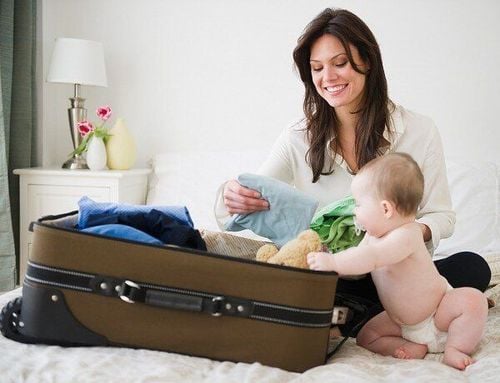This is an automatically translated article.
Crying is how babies communicate. According to a 2017 study, babies cry for about 2 hours a day for the first few weeks after birth. It increases and reaches a threshold of 2 to 3 hours per day after 6 weeks. By the time a baby is 4 months old, their crying may last for just over an hour a day. By then, you'll be more experienced at reading your baby's cues and cries. Besides, applying a few tips below can be helpful in making the baby stop crying.
1. Why do babies cry?
Newborns have many important things to tell you. In the first few months of life, the common reason for their crying is:
Hunger. Newborns feed every few hours, or 8 to 12 times in a 24-hour period. Some other signs of hunger other than crying are smirking, hand over mouth. Distention . Swallowing a lot of liquid can cause air to collect in your baby's belly, making him uncomfortable and fussy. Wet or dirty diapers. Newborns wet six or more diapers a day, so check your baby's diaper often. Tired. From day one to month three, babies sleep about 14 to 17 hours a day with two to four hours each. Overwhelmed. Keep your child in a quiet environment, away from people and noise. Hot or cold. Layering clothes works well for your baby, but too little or too much can make your baby uncomfortable and cry. Sick . Finally, sometimes crying is a sign that your baby isn't feeling well, so see your pediatrician.
2. 10 tips to help your baby stop crying
2.1. Wrap your baby in a scarf To you, swaddling feels like wearing a tight coat. But for a fussy baby, it feels like being back in the womb. How tight should you swaddle your baby? Neat just enough so that the child cannot freely wriggle his arms and legs. Make sure the baby is always lying on his or her back. This method should not be used when the child can turn over on his own.

Cách làm cho em bé nín khóc với một chiếc khăn quấn trẻ
2.3. Turn on white noise A little white noise is also a way to make babies stop crying, it helps babies feel like they are back in the womb. To recreate these soothing sounds, turn on the fan, place the bassinet near the dishwasher, run the vacuum cleaner, turn on the shower, or set the radio to silent mode. You should use the sound at a low but continuous level.
2.4. Pacifiers Newborns have strong suckling instincts, so a pacifier can soothe a crying baby. Plus, research shows that pacifiers help prevent sudden infant death syndrome (SIDS).
2.5. "Whist!" Play this sound right in the ear of a crying baby. Don't make the sound too low. Shhh loud enough for your baby to hear you clearly instead of the baby's own cry.
2.6.Take the baby for a walk When in the womb, the baby is used to being moved a lot. Try putting your child in a swing or in a rocking chair. Or you can put it in a baby rocking chair. Let the baby move gently, this will help the baby stop crying and go to sleep right away.
2.6. Baby Massage The power of gentle touch can do wonders for a fussy baby. And studies show that massaged babies seem to cry less and sleep better. You loosen the baby's clothes, stroke gently and slowly on the child's body. This can also help calm you down. Before using any oil or lotion on your baby, consult your pediatrician.
For children with colic, rub the abdomen in a clockwise motion or rotate the baby's feet gently to relieve pressure.
2.7. Carrying your baby In some cultures, babies are carried most of the day on their mother's back or chest. When you put a fussy baby in a sling, he or she will move closer to you and be lulled to sleep by your movement. The strap gives your hands a break or frees you to do other things. Always remember not to cook, eat, or drink anything hot while holding your baby.
2.8. Make your baby burp Crying babies swallow a lot of air, causing gas and bloating - and making their crying worse. With gentle pats on the back can make the baby burp, soothe the baby to make the baby stop crying. Classic position with the baby's head on your shoulder, however the baby may spit up on your back. You try by placing your baby face down in your lap or sitting up, supporting his chest and neck with your arms.

Làm trẻ ợ hơi là một trong các cách làm em bé nín khóc
2.9. Breathe Staying up every night with a fussy baby is a difficult task for parents. Feeling overwhelmed, frustrated, and not getting what you want is normal. Leave the baby in the care of your husband, another family member or babysitter. If you have no other choice, remember that you can let your baby cry in the crib for a bit.
2.10.See a doctor If you are concerned about your baby being fussy, take your baby to the doctor. The pediatrician guides and rules out any medical causes. Some babies just cry more than others. So the next time your baby's crying upsets you, remember two things: It's not your fault, and it won't be like this forever.
With many years of experience in examining and treating diseases in children, now the Pediatrics Department at Vinmec International General Hospital has become one of the major health care centers, capable of examining , screening and treatment of many specialized diseases in children. Therefore, if the child shows signs of prolonged crying for no apparent reason, parents can take the child to Vinmec International General Hospital for examination and receive support and advice from doctors and specialists. health family.
Please dial HOTLINE for more information or register for an appointment HERE. Download MyVinmec app to make appointments faster and to manage your bookings easily.
Reference source: webmd.com












